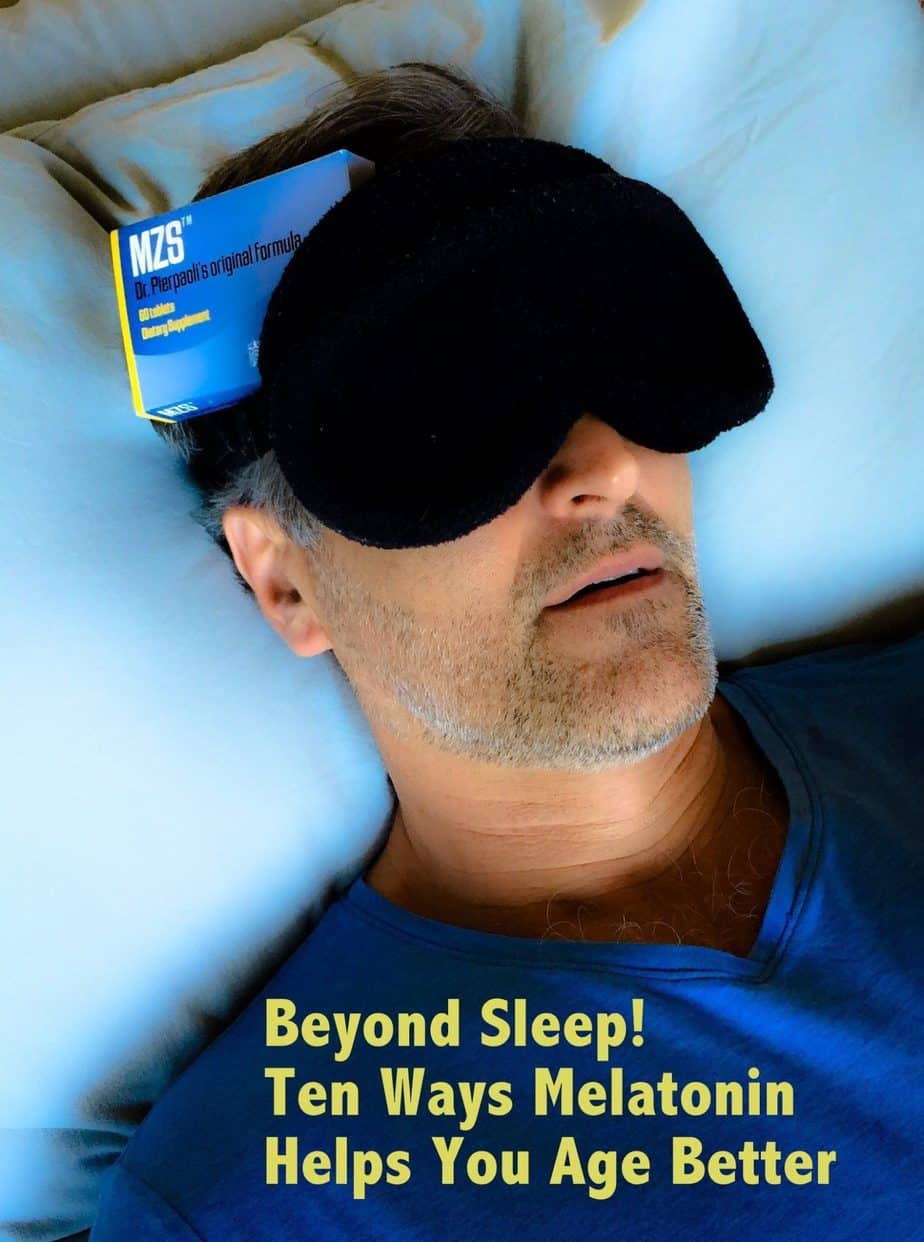Beyond Sleep: 10 Ways Melatonin Helps You Age Better (Watch)
You may have heard of melatonin, but did you know how powerful it is? More than inducing sleep, there are at least 10 ways melatonin helps you age better. And Dr. Pierpaoli’s Melatonin Zn Se may be the best ever made.
OVER THE last couple of months, I’d sit on my bed ready to lie down for the night’s slumber and pause. Inevitably, my glace would settle longingly upon the empty bottle of melatonin perched on the side table.
As I typically do with all my supplement consumption, I had taken a break from melatonin, even though it’s a pluripotent hormonal supplement that rapidly declines with age. Now, however, melatonin is back in my nightlife, but in a different form, one that’s designed to mimic the pineal gland’s release of melatonin.
Why should you care?
Because this cost-effective sleep-enhancer can improve your immune system, may have life extension properties, and can potentially ward off Alzheimer’s and cancer, among other helpful health contributions that I’ll soon address.
Who doesn’t want all that?
Read on and discover:
- Why Dr. Pierpaoli’s proprietary Melatonin Zn Se is superior to others;
- 10 ways that melatonin helps mitigate aging factors;
- My experience with it; and
- Proper dosage.
Before I introduce Dr. Pierpaoli and his Melatonin ZN, let’s dive into what the heck melatonin is, and why making it part of your supplement arsenal is one of the smartest decisions you can make.
Melatonin is a hormone that was discovered in 1958. You may have heard it referred to as the “sleep hormone” because melatonin is well known for helping some people get a better night’s sleep. This is true — melatonin is involved in regulating our internal body clock, but that capability just touches the surface of its deep health-promoting benefits.
Based on extensive research, scientists have discovered that melatonin has beneficial effects on everything from heart disease and diabetes, to bone health and obesity. Better yet, emerging science now suggests that it may protect our genetic material and guard against age related disease and decline. (1)
And now, some science-speak:
Melatonin is N-Acetyl-5-Methoxytryptamine, which is a mammalian hormone synthesized by methylation of serotonin by SAMe (another fantastic supplement), mainly in the pineal gland, but some is also synthesized in the retina, bone marrow and lymphocytes. The pineal gland and the retina synthesize melatonin in the absence of light, ie, at night or in darkness. (2)
Just had to get that off my chest.
Let’s now look at how melatonin can help improve sleep, the aging process, immunity, and the rest, which I’ve referred to as “10 ways melatonin helps you age better”, and then find out why Dr. Pierpaoli’s Melatonin ZN might be the best form of melatonin to take.
10 Ways Melatonin Helps You Age Better
If you’ve read my article, 7 Ways Science Will Repair the Damage of Old Age, you know that most chronic diseases correlate with age; meaning, it takes time for whatever poor lifestyle habits we may have to create sufficient accumulated damage to cause a disease.
Heart disease, obesity, metabolic syndrome, diabetes and cancer are all included. (Of course, there are heart-rending exceptions that happen to children.)
To the extent that anything (like melatonin) helps us not get some age-related chronic disease, it helps us “age better”. Seems logical. And that’s what this section addresses – how melatonin helps us age better by helping prevent the onset of various chronic diseases.
A tip of the hat to a Life Extension Foundation article and to “life-extensionist and inveterate scribbler” (so he says), Ben Best for his blog post on melatonin; together their missives informed much of the following information, and to which you can go to learn more.
#1 Sleep
Since melatonin is best known as a sleep enhancer, we’ll address this first.
Melatonin is a natural sleep-inducing agent. Daylight reduces melatonin production; thus blood levels of melatonin are low during the day, and high at night.
For people who go to sleep between 10 and 11:00 PM, natural melatonin production peaks between 2:00 and 4:00 AM, with the peaks becoming substantially lower with advancing age after early childhood. That melatonin production declines so drastically with age may explain many of the sleep disturbances seen in the elderly.
The next three graphs show when melatonin is naturally produced by the pineal gland at night, and how precipitously it declines with age, a key point in understanding why supplementing with melatonin could help improve your health as the years tick by.
First, look how melatonin production ebbs and flows during a 24-hour period, and note how it peaks in the middle of the night:
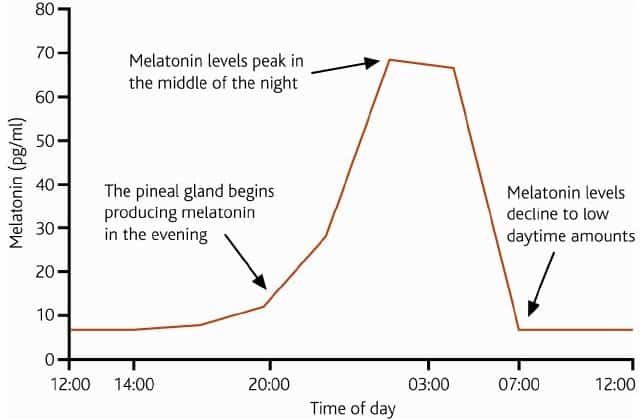 (Source)
(Source)
Now, let’s see how our melatonin production declines as we get older:
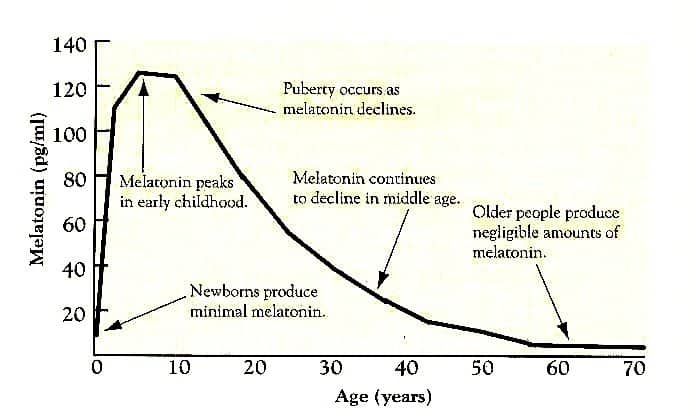 (Source)
(Source)
OK, we now know that melatonin declines as we get older and that – irrespective of age – whatever amount we do produce occurs in the middle of the night.
But note in this next graph how much that night time peak declines over time:
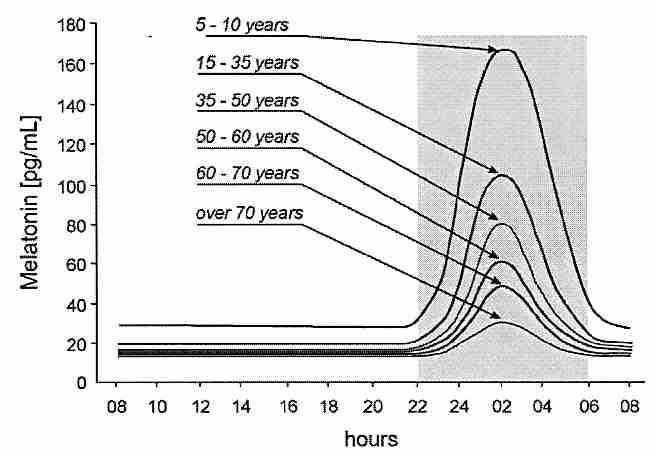 (Source)
(Source)
As you can see from the above graph, by the time you’re 50 years old, you’ve about two-thirds of the melatonin production you enjoyed as a child!
#2 Longer Lifespan
As you’ve just observed in the above graphs, melatonin plasma levels in humans (and all mammals) decline considerably with aging after early childhood. Lifespan studies on mice and rats have shown significant lifespan increase as a result of melatonin supplementation, when given to older rodents and when co-administered with Thyrotropin-Releasing Hormone (“TRH”, which is also produced in the pineal gland). (3)
Dr. Walter Pierpaoli’s experimental findings from 35 years of research has demonstrated the existence of a programmed “Aging Clock” in the pineal gland complex of the brain. He and his team have investigated the possible mechanisms and also the molecules which presumably cooperate and synergize with melatonin in the regulation and re-synchronization of the fundamental immunological and hormonal functions, (which are normally lost or deranged in the course of aging). He has observed that zinc can completely correct aging-dependent immuno-depression and several other hormonal and metabolic alterations typical of aging, and that the low zinc levels in aging animals can be restored to normal values with nocturnal administration of melatonin. (4)
The observation of the powerful anti-aging and immuno-enhancing activity of the combination of zinc and melatonin lead the development of Dr. Pierpaoli’s Melatonin Zn Se, addressed below.
#3 Antioxidant Defense
Melatonin has been found to possess 200% more antioxidant power than vitamin E, and reduces oxidative damage better than glutathione, vitamins C and E. Its free-radical scavenging capabilities make it a potent force against many chronic diseases, such as heart disease and cancer.
In post-menopausal women melatonin has been found to inhibit lipid peroxidation (damage to your fat cells caused by free radicals), thus leading to decreased levels of low-density lipoprotein (LDL) cholesterol, a primary precursor for the formation of atherosclerosis.
(For more on melatonin and antioxidants, and references for these assertions, go here and here. And if you’re still wondering if antioxidants might benefit you, read my article, Do You Really Need Antioxidant Supplements?)
#4 Immune System Enhancer
Immune system cells are typically vulnerable to free radical damage, which is why anti-oxidants such as melatonin are generally effective in boosting the immune system.
Melatonin is of benefit for both cellular and humoral immunity. Melatonin stimulates production of the cytokines InterLeukin−2 (IL−2), InterLeukin−6 (IL−6), and InterLeukin−12 (IL−12), which basically means that these proteins and signaling molecules – which are expressed by white blood cells – are an important part of immune system capability that are enhanced by melatonin.
And it doesn’t end there, because melatonin also stimulates the production of other immune system components, such as progenitor cells for granulocytes, macrophages, natural killer (NK) cells and certain helper T−cells (CD4+), while lowering harmful CD8+ cell concentrations. (5)
#5 Cardiovascular Disease Fighter
Since cardiovascular disease is the leading cause of death in the United States, melatonin’s ability to protect against heart damage is especially noteworthy as a cardioprotective nutrient.
Animal studies have provided ample evidence supporting melatonin’s antioxidant protection against heart muscle injury, reducing the damage done by a heart attack and improving the strength of the heart’s pumping action following a heart attack.
Other investigators report that melatonin decreases total cholesterol and LDL levels (the “bad” cholesterol), and increases HDL (the “good”) cholesterol levels. Scientists have discovered that individuals with metabolic syndrome have a lower melatonin production rate compared to healthier counterparts without metabolic syndrome, and that individuals with metabolic disturbances in blood pressure, cholesterol, and blood sugar management (all classic features of metabolic syndrome) possess lower melatonin levels than those with normal metabolic function.
(For more on melatonin and cardiovascular disease, and references for these assertions, go here.)
#6 Cancer Therapy Helper
Emerging research suggests that melatonin has anticarcinogenic properties—meaning it has the ability to prevent cancer from occurring, or to induce cancer cell death if it does occur.
Melatonin might be able to do this due to its antioxidant, anti-inflammatory, anti-proliferative, and hormone-modulating properties. It has been successfully used in individuals with advanced stage cancers undergoing conventional anticancer therapy, by either slowing disease progression and/or decreasing treatment side effects.
In a review of eight randomized, controlled clinical trials evaluating the benefits of melatonin as an additional therapy for cancer patients with solid tumors undergoing chemotherapy or radiation therapy, researchers found that concurrent use of 20 mg of melatonin once daily versus conventional treatment alone, improved the rate of complete or partial remission by nearly 50%, increased the one-year survival rate by 45%, and decreased the devastating side effects of conventional therapy such as low platelet count, neuropathy, and fatigue by 89%, 83%, and 65% respectively, with no adverse events reported.
(For more on melatonin and cancer, and references for these assertions, go here and here.)
#7 Diabetes Protector
You can think of diabetes as belonging to the family of “free radical diseases”, along with cardiovascular disease and cancer. Research has found that people with type 2 diabetes and retinopathy experience alterations of their melatonin secretion.
Given that melatonin is a major free-radical scavenger (aka, antioxidant), it’s not surprising that preclinical research repeatedly and consistently documents its beneficial antioxidative effects in diabetics and others with high blood sugar.
Melatonin has also been shown to protect pancreatic beta-cells and several diabetes-affected organs (including kidney, retina, brain, and vasculature) from free radical damage. In various studies, melatonin treatment has produced reductions in blood glucose, hemoglobin A1c, and cholesterol.
(For more on melatonin and diabetes, and references for these assertions, go here. And if you have high blood sugar and don’t know about Berberine and Amla, read my article, Eight Steps to Get More Sex and A Longer Life by Supercharging Your Blood)
#8 Delay Alzheimer’s
Intensive research over the past decade has indicated melatonin’s beneficial effects in experimental models of neurodegenerative disorders and many central nervous system diseases, specifically those linked to oxidative damage.
Specifically, melatonin can help delay the onset of Alzheimer’s disease and help protect vital cellular structures, such as mitochondria, from oxidative damage and decay. Declines in mitochondrial function are a hallmark feature of many neurodegenerative diseases including Alzheimer’s disease, Parkinson’s disease, and Huntington’s disease.
Preclinical studies revealed that melatonin exerts pronounced neuroprotective effects against beta amyloid plaque, one of the specific underlying causes of Alzheimer’s disease.
(For more on melatonin and Alzheimer’s, and references for these assertions, go here.)
#9 Whittle Away Obesity
Obesity is often associated with stress, emotional eating, sleep-deprivation, and hormonal changes later in life. A recent study in women with night eating syndrome (an eating disorder characterized by late-night binge eating) found that women suffering from this disorder had pronounced circadian melatonin rhythm disturbances, which also affected levels of cortisol (a stress hormone that can be a factor in weight problems) and ghrelin (a hormone that stimulates hunger). It also affected a variety of other behavioral and physiological circadian markers involved in appetite and neuroendocrine regulation.
Turning to women to rodents; in middle-aged rodents, daily melatonin administration was found to suppress abdominal fat, plasma leptin levels, and insulin levels in middle-aged rodents, while also reducing body weight and food intake.
Furthermore, laboratory investigations discovered melatonin’s ability to activate brown adipose tissue, which encourages your body to burn fat instead of storing it The rat studies indicate that supplementing those that are obese with 4mg/kg/day of melatonin resulted in reductions in body weight, belly fat, serum insulin levels, and triglycerides.
In humans, the equivalent dose is 48 mg for a 165 lb adult, which is a very high dose that could produce next day drowsiness. Typical human doses for melatonin range from 300 micrograms to 10 milligrams at bedtime (see Dosing below), so forget about using more of it unless your doctor so advices.
(For more on melatonin and obesity, and references for these assertions, go here. I’ve written a five-part series on obesity, starting with, The Seriously Serious Problems of Obesity.)
#10 Prevent Osteoporosis
Data derived from animal research suggests that melatonin has beneficial effects on bone repair and remodeling, and bone mineral density, which would make it an ideal candidate for the prevention of osteoporosis or as adjuvant after bone fractures.
A small double blind, placebo-controlled pilot study investigated the effects of melatonin on bone health and quality of life in 18 perimenopausal women (ages 45-54) for 6 months. It found that melatonin improved physical symptom scores (e.g., feeling and sleeping better), increased osteocalcin (a marker for bone formation), and decreased levels of Type-I collagen cross-linked N-telopeptide (a marker for bone resorption), indicating that melatonin may restore imbalances in bone remodeling and prevent bone loss. (6)
(For more on melatonin and osteoporosis, and references for these assertions, go here.)
Check out Wikipedia’s page about melatonin to learn of more of it’s health benefits; for instance, there’s some evidence that melatonin may be helpful to those suffering from gallbladder stones, autism and headaches.
Dr. Pierpaoli’s Melatonin Zn Se
OK, so perhaps now you’re convinced that you’ve just gotta have it. The question is, which type to take and which brand?
Prior to learning about Melatonin ZN, I was happy with most any sublingual type (placed under the tongue) and reputable. I’d pop a 2.5 mg tablet under my tongue and drop my head to the pillow. Slowly it would dissipate and be absorbed, and perform its marvels upon my very own self.
Now, however, I’m intrigued with Dr. Pierpaoli’s Melatonin Zn Se for two reasons:
- He’s a world-class scientist and expert on melatonin;
- In addition to the pharmaceutical grade melatonin used in his formula, it also contains carefully balanced synergistic ingredients Zinc and Selenium, two vital trace elements that help repair cells and render Melatonin Zn Se even more effective; and
- He developed a form of melatonin that mimics the pineal glands own release of melatonin, meaning Melatonin Zn Se is the only melatonin supplement to follow nature’s own nighttime peak.
The following graph compares Dr Pierpaoli’s melatonin formula (red line) to the natural release of melatonin (dark blue line) and to two common types of melatonin supplements (light blue and green line) to demonstrate that ordinary sublingual melatonin peaks too soon, and that time released formulas peak too late.
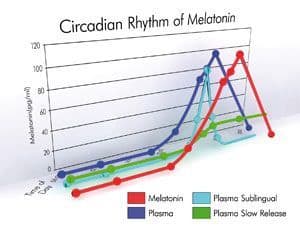 (Source)
(Source)
So, let’s watch the good doctor explain what he’s up to:
Click the graphic below and you can get Dr. Pierpaoli’s book about melatonin:
Click the following graphic to go Amazon.com to review his Melatonin Zn Se:
Melatonin Dosing and the Dark of Night
When it comes to melatonin, less is more, to an extent. Everything I’ve read on the subject indicates that most of us don’t need more than 5 mgs per night.
With Melatonin Zn, the dose is half to one 3 mg tablets at bedtime only. Never take more than two. Only use Melatonin Zn Se when you are prepared to sleep and have the light switched off, because light entering the eye destroys Melatonin.
That last point bears some highlighting.
Many of us sleep in bedrooms with outside lights filtering in, or some colored luminescence glowing from an alarm clock, nite light or some electronic device.
Not good. Even a bit of light can disturb melatonin production.
You could black out your windows somehow and pull the plug on everything that glows, but a simpler solution is what I do – don a black night mask. Not one of those thin, skimpy ones, but something thick that will so well cover your eyes that even if you open them you see only the void.
It might take some getting used to, but it’s a lot easier than the alternatives. This one from Amazon.com best approximates what I use.
My Experience With Melatonin
I’ve already indicated that melatonin is typically an important part of my supplement arsenal. Most evenings before going to sleep, slipping an sublingual tab under my tongue is as common as shutting my eyes.
As I typically do, however, I’ve taken a break from melatonin — in fact, a break from most all the supplements regularly consumed. One reason for this is that I don’t want to become dependent on anything, whether physiologically or psychologically. Another reason is due to the principal of hormesis.
This is what I wrote about hormesis in Do You Really Need Antioxidant Supplements?:
Hormesis is a natural process ignited in response to various physiological stresses and disease, and exists in every successful organism, from plant to bug to whale. To put it simply (for a change), hormesis is biology’s way of responding to things that can be injurious by making an organism stronger in response.
Think flu shot. A little bit of influenza in every drop puts our immune system in overdrive and develops resistance to the virus. In effect, that little bit of harm makes us stronger. Another example of hormesis is the body’s natural response to oxidative stress. […] a modest amount of oxidative stress is good for you, and confers a number of beneficial health effects.
Though this is becoming clear among scientists, what remains opaque is how much oxidative stress is no longer good. There is a threshold level that is optimum for life extension, above which retards lifespan, and we don’t know what that is; moreover, certainly it’s different for different people.
So, a cycle in and out of supplementation, and also cycle how much of each I take, and this is why of been off melatonin for some months now, longer than usual, frankly.
When I came across information about Dr. Pierpaoli’s Melatonin Zn, I was convinced enough to try it. The first three days were weird for reasons that may have entirely to do with me, than the common experience. I would wake up between 2 and 3:00 AM, just when the pituitary is supposed to be producing melatonin and Zn is supposed to be releasing melatonin.
You’d think the opposite would happen, given all that melatonin surging — that I’d go deeper into sleep.
I don’t have a theory about why this happened. It’s early yet (I’m on my sixth day with Zn), but I can report that since then my sleep has been deep and restful.
Give Melatonin Zn Se a try — it’s inexpensive, safe, and as you’ve just read, it’s a potent supplement for healthy aging.
Yep.
Last Updated on February 27, 2022 by Joe Garma

